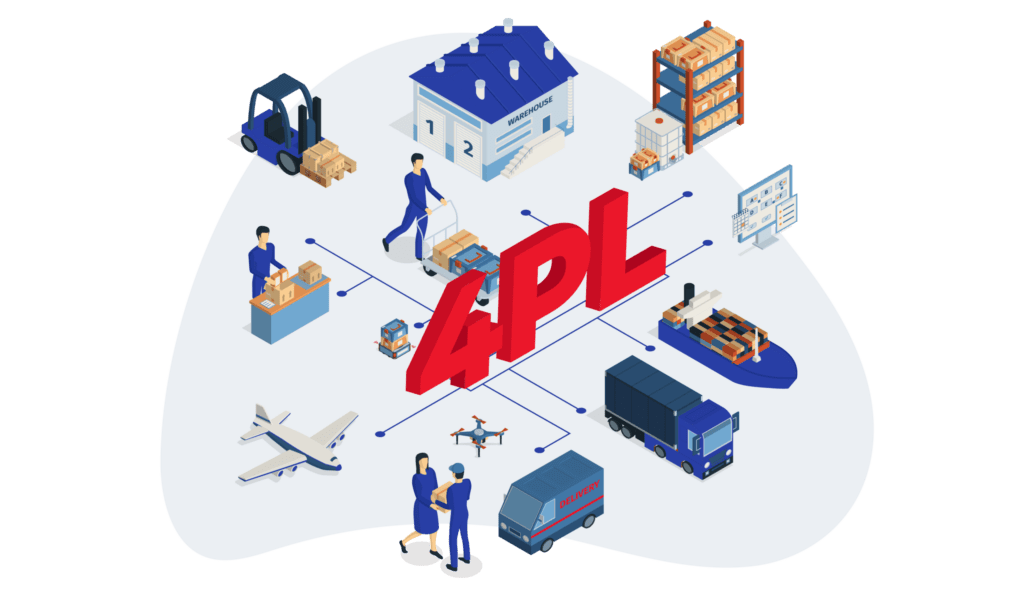
The comparison between Third-Party Logistics (3PL) and Fourth-Party Logistics (4PL) is pivotal in understanding the evolving landscape of supply chain management. As businesses increasingly seek more efficient, streamlined, and strategic approaches to managing their logistics, the distinction between these two models plays a significant role in shaping their operational strategies. The fundamental differences between 3PL and 4PL extend beyond mere service provision, delving into the depth of involvement, strategic outlook. nd comprehensive orchestration within the intricate web of supply chain logistics.
What is a 4PL?

A 4PL, or Fourth-Party Logistics, refers to a higher level of logistics outsourcing where the logistics provider acts as a single point of contact for supply chain management. In essence, a 4PL is an integrator that oversees the entire supply chain and coordinates the various third-party logistics providers involved.
What is a 3PL?

A Third-Party Logistics (3PL) provider is a company that offers outsourced logistics and supply chain management services to support various aspects of a business’s logistics needs. These services can include transportation, warehousing, distribution, freight forwarding, inventory management, and other logistics-related operations.
Differences between a 3PL vs a 4PL
The primary differences between a Third-Party Logistics (3PL) provider and a Fourth-Party Logistics (4PL):
Scope of Services:
- 3PL: A 3PL typically offers specific logistics services, such as transportation, warehousing, freight forwarding, and distribution. These services are often more transactional and operational in nature, focused on individual aspects of the supply chain.
- 4PL: A 4PL, on the other hand, offers a more comprehensive approach. It functions as a supply chain integrator, managing and overseeing the entire supply chain network. The 4PL designs, builds, and executes supply chain solutions, coordinating various 3PLs and other service providers. Their role is more strategic and consultative.
Level of Involvement:
- 3PL: 3PL providers are directly involved in executing and managing logistics operations. They might handle specific segments of the supply chain, offering expertise and resources for those services.
- 4PL: A 4PL acts as an intermediary or coordinator, overseeing and managing multiple 3PLs. They don’t own physical logistics assets but provide higher-level services by integrating and optimizing the entire supply chain. Often through technology and strategic planning.
Relationship with Client:
- 3PL: 3PL providers work directly with the client, offering specialized services to meet specific logistical needs.
- 4PL: 4PL providers serve as an extension of the client’s business, offering a more strategic partnership and a holistic approach to managing the supply chain. They serve as the main point of contact and manage relationships with multiple 3PLs.
Focus and Expertise:
- 3PL: Their expertise lies in executing and managing logistics functions efficiently, focusing on the operational aspects of the supply chain.
- 4PL: 4PL providers focus on strategic planning, supply chain optimization, and leveraging technology to improve overall supply chain efficiency. They offer more consultative and strategic services, focusing on the bigger picture of supply chain management.
In summary, while both 3PL and 4PL providers offer logistics services, a 3PL tends to focus on specific operational logistics functions. hile a 4PL takes on a broader.
3PL vs 4PL : Which type of logistics model is best for your business?

Determining whether a 3PL or 4PL logistics model is best for your business depends on various factors. Its specific logistics requirements, and your long-term strategic goals. Here are some considerations for each model:
3PL might be suitable for your business if:
- Specific Service Needs: If your business requires specialized or individualized logistics services, a 3PL might be a good fit. For instance, if you only need warehousing, transportation, or specific logistics functions, a 3PL can cater to those needs.
- Operational Focus: Your priority is managing day-to-day logistics operations and you prefer to outsource certain aspects of your supply chain, leaving the detailed execution to experts.
4PL might be suitable for your business if:
- Holistic Supply Chain Optimization: If your goal is to streamline the entire supply chain and achieve a more integrated and optimized logistics network, a 4PL can coordinate multiple 3PLs to provide a more strategic and holistic approach.
- Complex Supply Chain Operations: If your business operates across various regions, involves multiple 3PLs or has a complex supply chain structure, a 4PL can help manage and optimize these complexities.
Ultimately, the decision between a 3PL and 4PL depends on your business’s unique needs, scale, complexity, and strategic direction. It might even be a combination or hybrid model that best suits your requirements.